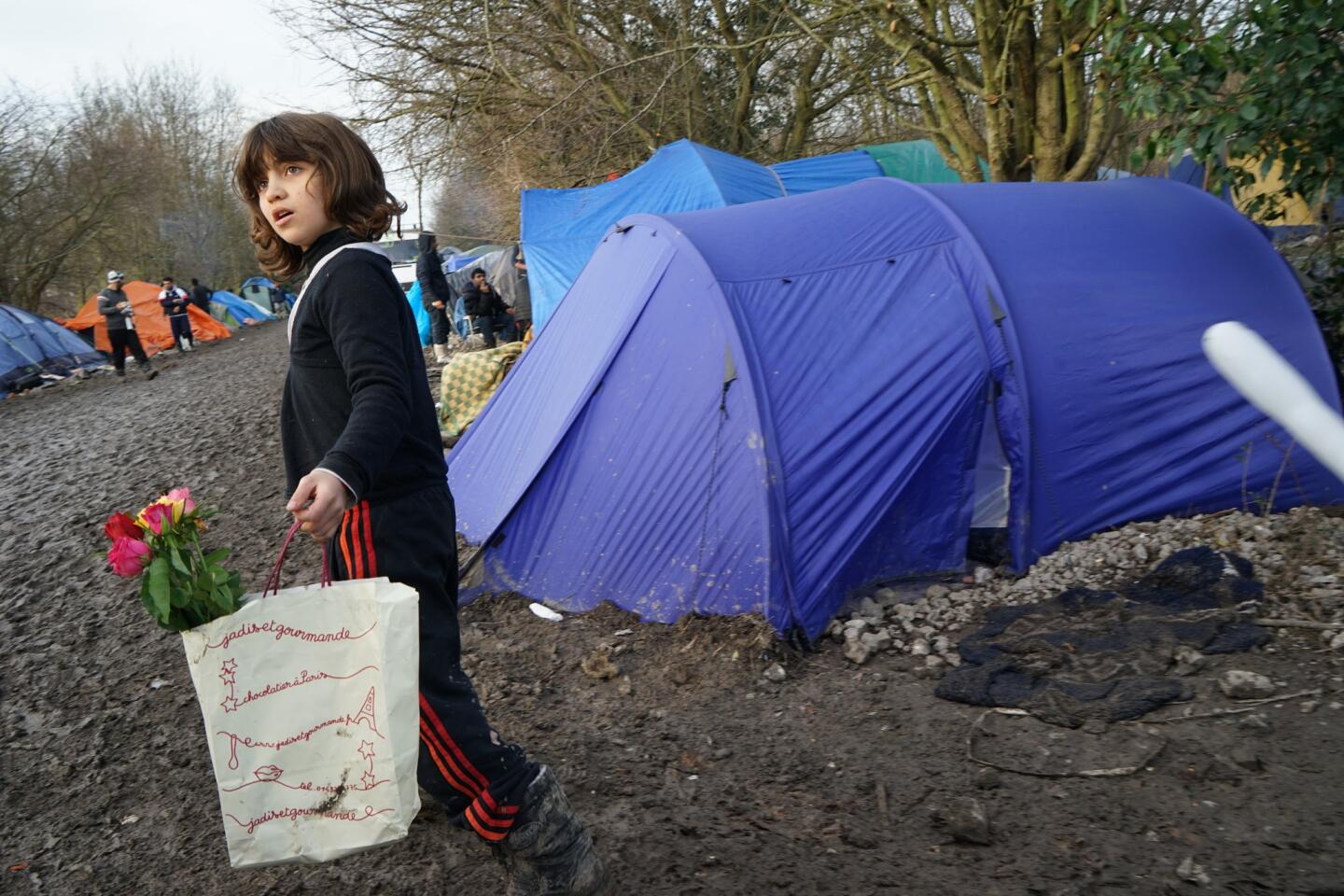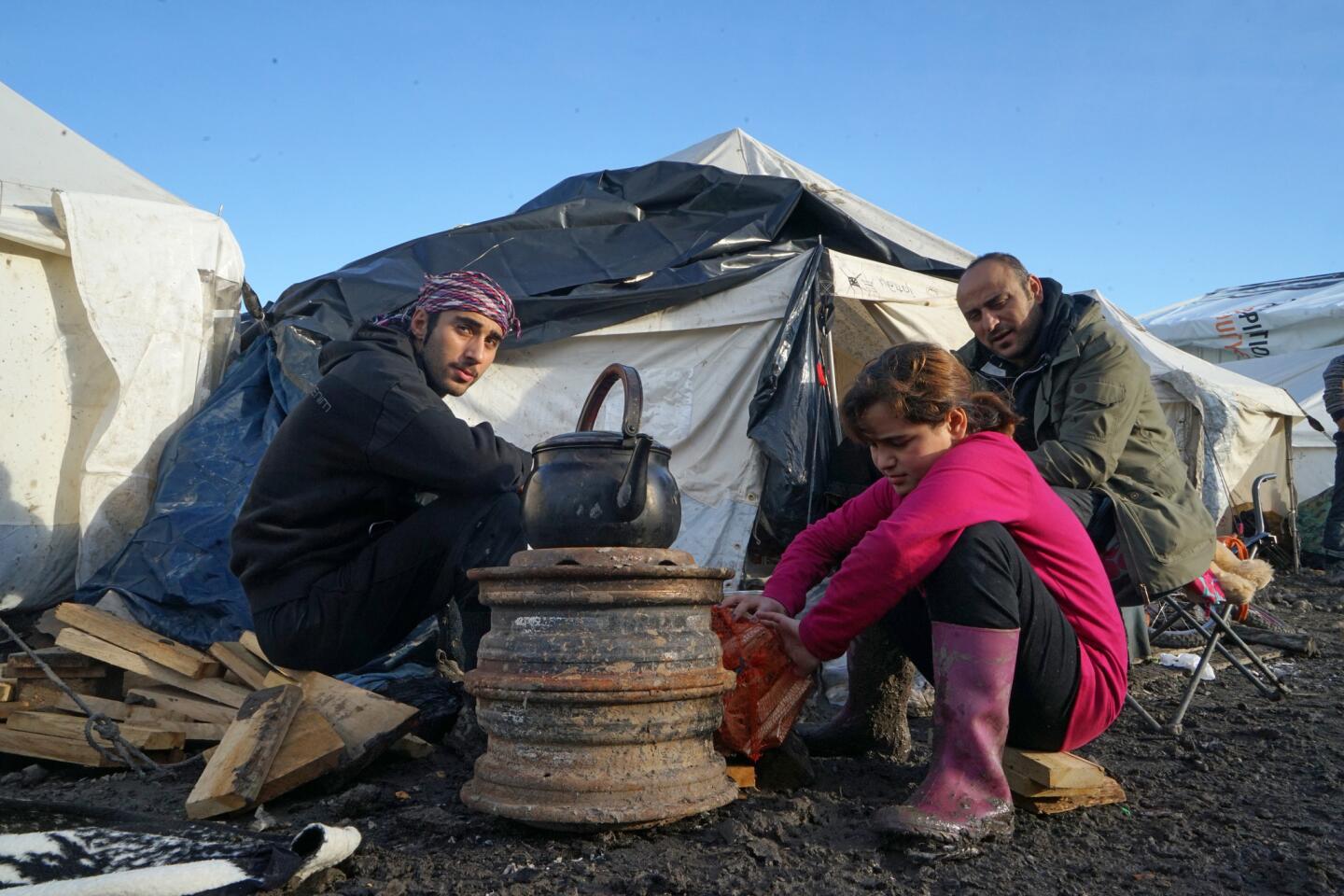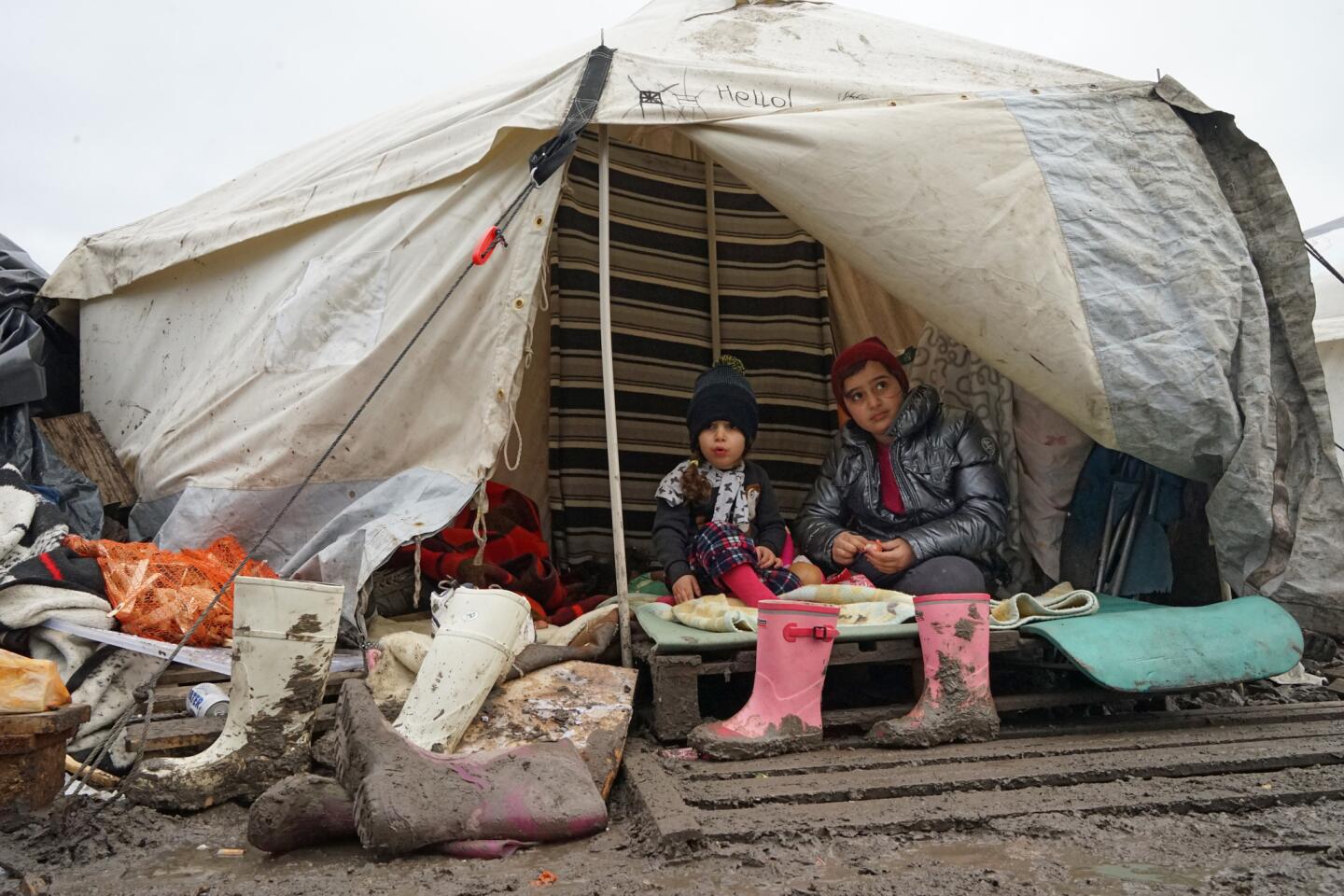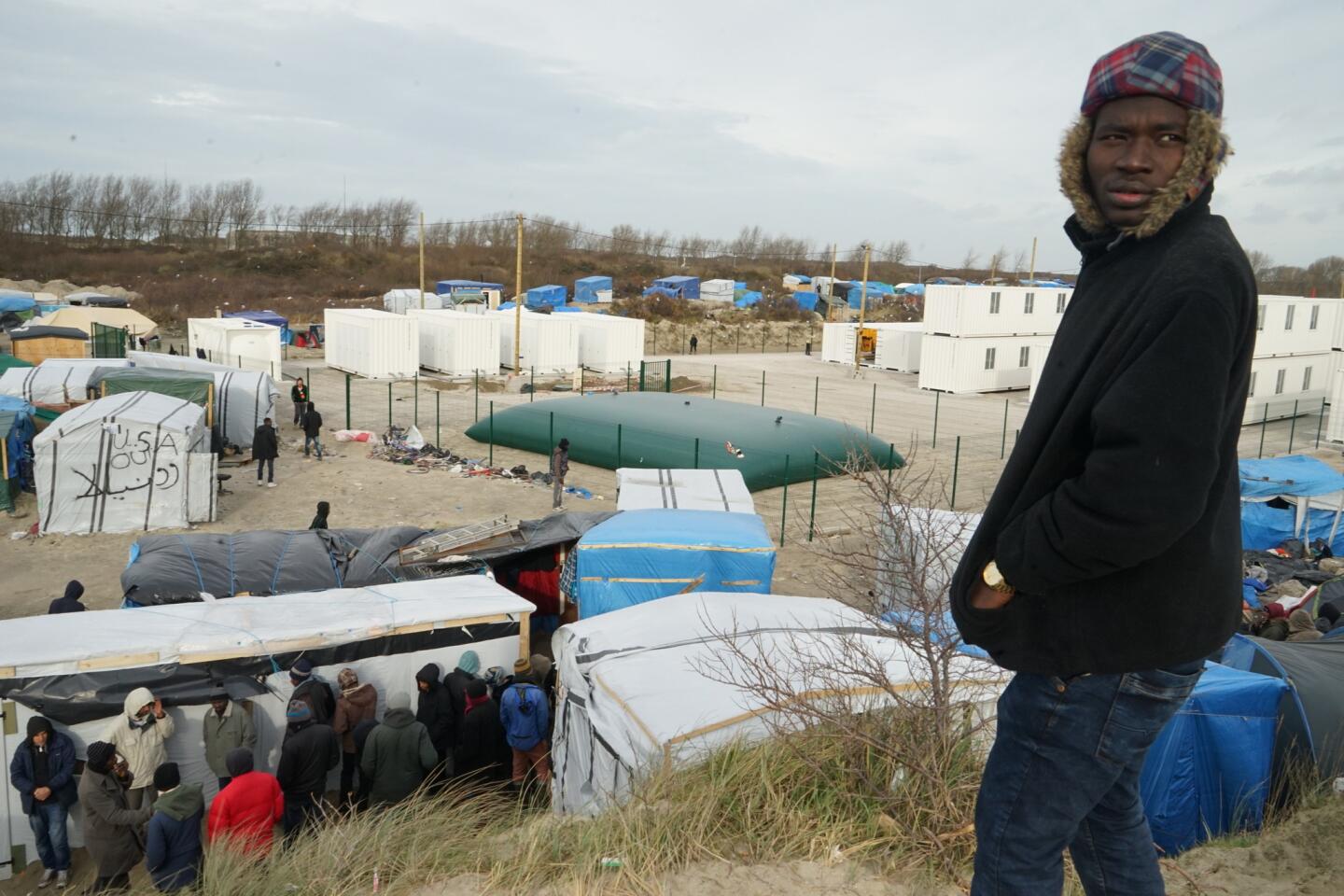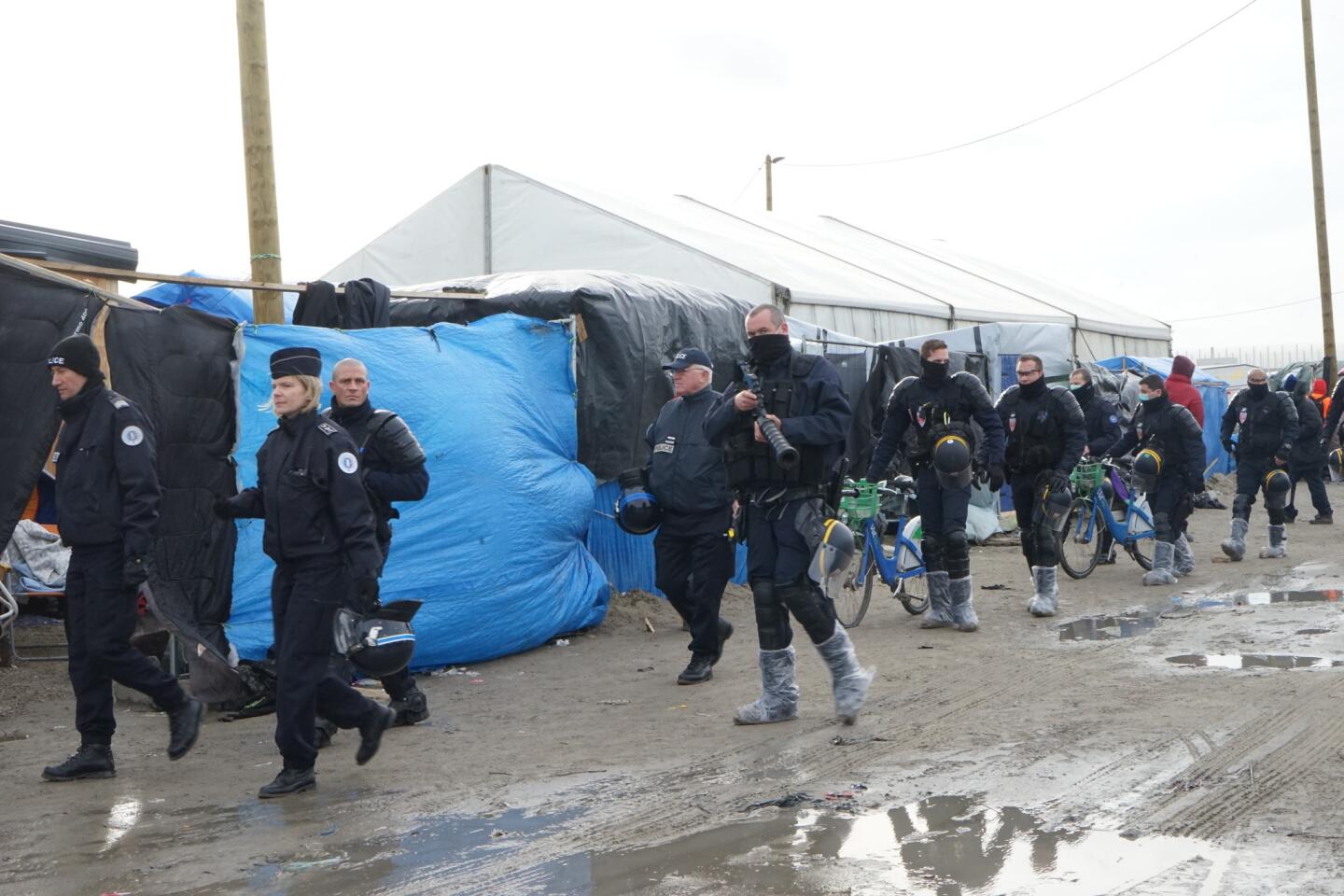Kurdish migrants mired in a stultifying waiting game on the muddy coast of France
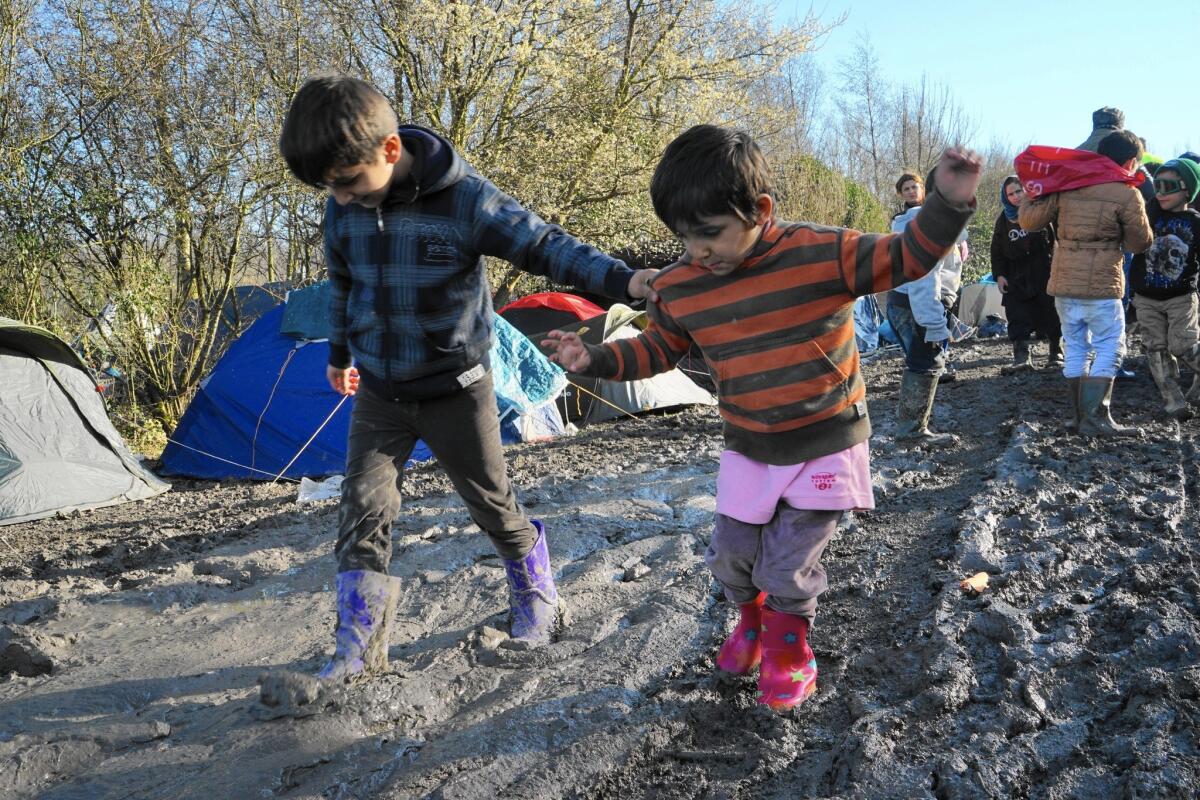
Migrant children at the Grande-Synthe camp on the northern coast of France make their way to their tents.
- Share via
reporting from GRANDE-SYNTHE, France — The developer’s cheerful blueprint, touting a leafy suburban haven, greets returning camp residents as they trudge through the gullies of dense mud that grabs boots and devours dreams.
“Live the city life — in the country!” it promises, but the residential retreat planned for this clearing never came to pass.
These days, few squatting in the mire speak French or even notice the sign in a landscape that now resembles the muck of the trenches that lined this region during the Great War.
England is the destination of the more than 2,500 mainly Kurdish migrants who have found themselves stranded here near the coastal port of Dunkirk, and as with the armies of old, it seems no nearer than when most of them arrived.
Stranded travelers bide their time in tents, abandoned trailers and makeshift abodes crafted of plywood and plastic tarps, gathering around wood fires and gas-cylinder heaters for warmth.
“We are suffering here,” says Mohammed Mardan, 32, sipping tea beneath a tent flap in the slashing rain. Outside the trailer that houses his family is a forlorn collection of teddy bears strung on a tree, now drenched and drooping beneath the leaden sky.
“It spreads a little joy in this place,” he explains.

The waterlogged despair this winter at makeshift camps across northern France is part of the escalating migrant crisis that is threatening to tear apart the European Union.
Razor wire, barricades, riot police and tear gas have failed to halt the flow of humanity from the Middle East, Afghanistan and Africa, now mostly entering mainland Europe via boats from Turkey to Greece.
“Do not come to Europe,” European Council President Donald Tusk warned potential migrants last week, though an estimated 2,000 new arrivals a day are disembarking on Greek shores and starting to make their way north. “Do not risk your lives and your money. It is for nothing.”
Thirty miles southwest of here, near the port of Calais, is a migrant shantytown that has come to be known as “the Jungle” — a surreal expanse of hovels and shops, mosques and churches, bars, discotheques and eateries that is home to more than 4,000.
While Grande-Synthe is somber and drab, the Jungle, powered by countless generators, rocks to a melange of African, Asian, Middle Eastern and Western beats, a vibrant if ramshackle subculture that has transformed the old port town.
But French residents and authorities, convinced that the migrant encampment is impeding cross-channel commerce and devastating the tourism industry, have had enough.
Recently, bulldozers accompanied by French riot police began demolishing a southern swath of the encampment, sparking clashes.
The legions camped out along the French coast have little prospect of getting to England, just 20 miles or so across the slate-gray waters. The British government has made it clear it is not opening its doors.
So the majority — many of them middle-class professionals in their homelands, now stuck in grimy destitution — engage in a stultifying waiting game.
“My dream is England,” says Sarwan Hussein, who is staying at Grande-Synthe with his wife and four children. “That is where we want to start our new life.”
All appear to view Britain as something of a promised land. Most have never been there, though everyone seems to have a relative who made it — someone, as they often describe it, slinging shawarma sandwiches in Glasgow, running kebab joints in Leeds or hawking cellphones in East London.
En route to this wind-swept coast, many have passed on chances to apply for asylum in Germany or head north to Sweden, where governments are considerably more welcoming.
“They have this image of England as some kind of paradise,” said Shay Rojansky, a logistics worker at Grande-Synthe with Doctors Without Borders, the international charity that has helped install showers, toilets and provided medical aid here and at migrant way-stops across the continent. “They all believe it.”
There is a darker side to their predicament. Smugglers charge $5,000 or more for promised slots aboard vehicles bound for Britain. Shady and sometimes violent characters are said to run food and other concessions servicing the camps.
Almost every evening, young men from the marooned multitudes try to rush the entrance to the Eurotunnel that crosses beneath the English Channel from Calais, or stow away in trucks crossing the channel.
Some wind up falling off trucks or tumbling while trying to scale fences and walls. Few make it to the other side. Ambulances wail through the evening.
“I’ll try again once I get better,” vows Sharam Hormani, 29, a barber and export-import entrepreneur from the northern Iraqi city of Kirkuk who broke his leg when he fell from a fence while trying to catch a ride. “Iraq is being overrun by the militants. I don’t see any hope at home.”
The regional terrain has taken on a freshly fortified appearance along a coastal strip where hulking concrete bunkers built by occupying Germans during World War II still dot the shoreline. French police have erected cascading rows of glittering, steel-gauge fencing topped with barbed wire in a bid to slow the nightly onslaught on the Eurotunnel. Convoys of police reinforcements, many brought in from elsewhere in France and toting semiautomatic weapons, guard strategic choke points. The acrid stench of tear gas lingers in the air.
The French government is making converted shipping containers available for housing, providing clean accommodation, heat and shelter from the elements. But most here appear to have rejected them, many fearful that they will have to be fingerprinted to obtain the housing and then be forced to remain in France — thus dashing any chance, however remote, to get to England.
Instead, many of the Jungle residents recently displaced wind up moving to other camps like the one at Grande-Synthe, where conditions are far worse.
“I just wish I had never left England to begin with,” says Bahman Jundi, 40, an Iraqi Kurd of mountainous dimensions who was found playing dominoes with others inside a circus-style big-top tent at Grande-Synthe.
A half-dozen of the striped tents, donated by a British charity, soar from one end of the camp like fairy castles rising above the dystopian panorama.
Jundi, a former auto mechanic in Birmingham, is one of the few who has been to England. He shares with his Kurdish kin word of the myriad opportunities, stoking dreams of ample jobs and social welfare benefits across the channel.
Jundi left England seven years ago to rejoin his wife and three children in Iraq, hopeful that the U.S.-led toppling of former President Saddam Hussein would lead to stability and a robust economy. But it didn’t work out that way.
Now, he’s trying to get back to England, though he lacks legal papers.
“I thought life without Saddam would be better in Kurdistan,” Jundi said as he rose from the domino table and maneuvered his way onto a plywood boardwalk atop the sludge, his great bulk balancing precariously on the creaking planks. “I was wrong. I wish I had stayed in England in the first place. Now we are all trapped here in this mess.”
Special correspondent Nabih Bulos in Grande-Synthe, France, contributed to this report.
Twitter: @mcdneville
More to Read
Sign up for Essential California
The most important California stories and recommendations in your inbox every morning.
You may occasionally receive promotional content from the Los Angeles Times.
